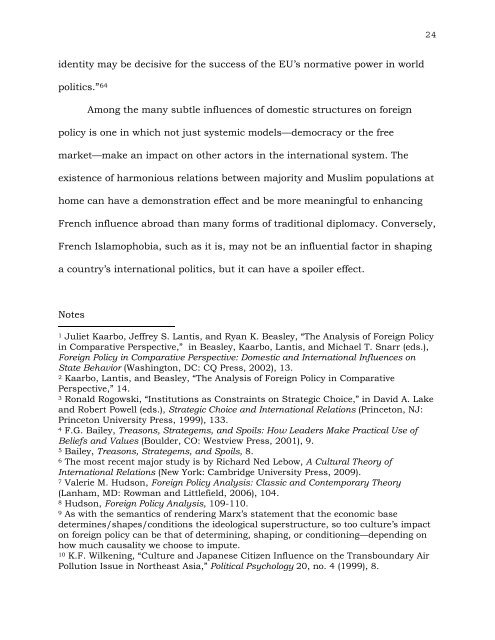La politique du dehors avec les raisons du - European University ...
La politique du dehors avec les raisons du - European University ...
La politique du dehors avec les raisons du - European University ...
You also want an ePaper? Increase the reach of your titles
YUMPU automatically turns print PDFs into web optimized ePapers that Google loves.
identity may be decisive for the success of the EU’s normative power in world<br />
politics.” 64<br />
Among the many subtle influences of domestic structures on foreign<br />
policy is one in which not just systemic models—democracy or the free<br />
market—make an impact on other actors in the international system. The<br />
existence of harmonious relations between majority and Muslim populations at<br />
home can have a demonstration effect and be more meaningful to enhancing<br />
French influence abroad than many forms of traditional diplomacy. Conversely,<br />
French Islamophobia, such as it is, may not be an influential factor in shaping<br />
a country’s international politics, but it can have a spoiler effect.<br />
Notes<br />
1 Juliet Kaarbo, Jeffrey S. <strong>La</strong>ntis, and Ryan K. Beasley, “The Analysis of Foreign Policy<br />
in Comparative Perspective,” in Beasley, Kaarbo, <strong>La</strong>ntis, and Michael T. Snarr (eds.),<br />
Foreign Policy in Comparative Perspective: Domestic and International Influences on<br />
State Behavior (Washington, DC: CQ Press, 2002), 13.<br />
2 Kaarbo, <strong>La</strong>ntis, and Beasley, “The Analysis of Foreign Policy in Comparative<br />
Perspective,” 14.<br />
3 Ronald Rogowski, “Institutions as Constraints on Strategic Choice,” in David A. <strong>La</strong>ke<br />
and Robert Powell (eds.), Strategic Choice and International Relations (Princeton, NJ:<br />
Princeton <strong>University</strong> Press, 1999), 133.<br />
4 F.G. Bailey, Treasons, Strategems, and Spoils: How Leaders Make Practical Use of<br />
Beliefs and Values (Boulder, CO: Westview Press, 2001), 9.<br />
5 Bailey, Treasons, Strategems, and Spoils, 8.<br />
6 The most recent major study is by Richard Ned Lebow, A Cultural Theory of<br />
International Relations (New York: Cambridge <strong>University</strong> Press, 2009).<br />
7 Valerie M. Hudson, Foreign Policy Analysis: Classic and Contemporary Theory<br />
(<strong>La</strong>nham, MD: Rowman and Littlefield, 2006), 104.<br />
8 Hudson, Foreign Policy Analysis, 109-110.<br />
9 As with the semantics of rendering Marx’s statement that the economic base<br />
determines/shapes/conditions the ideological superstructure, so too culture’s impact<br />
on foreign policy can be that of determining, shaping, or conditioning—depending on<br />
how much causality we choose to impute.<br />
10 K.F. Wilkening, “Culture and Japanese Citizen Influence on the Transboundary Air<br />
Pollution Issue in Northeast Asia,” Political Psychology 20, no. 4 (1999), 8.<br />
24

















